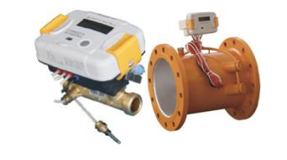
Heat meters are essential devices used for measuring the amount of thermal energy consumed or delivered in heating systems. Whether in residential, commercial, or industrial settings, accurate heat measurement is crucial for efficient energy management, billing, and reducing environmental impact. Among the various types of heat meters, ultrasonic and electromagnetic heat meters are gaining prominence due to their high accuracy, reliability, and non-invasive operation. This article explores the technologies behind these heat meters, their applications, and the benefits they offer.
What is a Heat Meter?
A heat meter is an instrument used to measure the energy used for heating purposes in a system. The measurement is typically based on the flow of the heating medium (water or steam) and the temperature difference between the inlet and outlet of the heating system. The device calculates the amount of thermal energy transferred by the fluid through the system, usually in kilowatt-hours (kWh).
Heat meters are widely used for heat consumption measurement in district heating systems, individual heating units, and industrial applications. The accurate monitoring of thermal energy consumption allows for smart heat metering and effective energy billing, improving both cost management and energy efficiency.
Types of Heat Meters
An ultrasonic heat meter uses ultrasonic waves to measure the flow rate of the fluid (typically water) in the heating system. These meters work by emitting ultrasonic sound waves through the fluid, and the time it takes for the sound to travel is used to calculate the flow velocity. By measuring the temperature difference between the inlet and outlet of the system and combining it with the flow data, the ultrasonic meter calculates the energy consumed.
The advantages of ultrasonic heat meters include:
•Non-invasive measurement: There are no moving parts, reducing wear and tear.
•High accuracy: Ultrasonic meters provide precise flow and temperature measurements, ideal for systems with varying flow rates.
•Long service life: Due to the absence of moving parts, ultrasonic heat meters have a low maintenance requirement.
These features make ultrasonic heat meters suitable for both residential and industrial applications where accurate and reliable heat measurement is essential.
Electromagnetic heat meters operate based on Faraday’s Law of Induction. They measure the flow of conductive liquids (such as water) using magnetic fields. As the liquid flows through the pipe, the magnetic field induces a voltage proportional to the velocity of the liquid. By combining the flow rate data with the temperature difference, the electromagnetic heat meter calculates the thermal energy consumption.
The key benefits of electromagnetic heat meters include:
•Highly accurate in conductive fluids: These meters work well in systems with water and other conductive fluids.
•No moving parts: Like ultrasonic meters, electromagnetic meters have no moving components, enhancing durability and reducing maintenance.
•Reliability: Electromagnetic heat meters are less affected by changes in pressure, viscosity, and temperature, making them suitable for a wide range of heating systems.
These meters are ideal for use in district heating systems, industrial applications, and HVAC systems where the fluid is conductive, and high reliability is required.
Applications of Heat Meters
Heat meters have broad applications in various industries and sectors, contributing to energy efficiency, cost management, and sustainability. Some of the key applications include:
1.District Heating Systems: In urban areas, heat meters are crucial for heat consumption measurement in district heating systems, where multiple buildings share a centralized heating source. These meters help in accurately billing residents or tenants based on the energy they consume.
2.Residential and Commercial Heating: In individual apartments, buildings, and commercial properties, heat meters allow for accurate monitoring of heating energy usage. This is essential for fair billing, especially in buildings with shared heating systems or multiple tenants.
3.Industrial Applications: Heat meters are used in industrial heating processes, including manufacturing, chemical processing, and food production. By monitoring heat usage, industries can optimize their energy consumption, reduce costs, and improve the sustainability of their operations.
4. Smart Energy Management: With the rise of smart cities and IoT-based solutions, smart heat metering systems are becoming increasingly popular. These systems provide real-time data on energy usage, enabling consumers and businesses to monitor and optimize their heating consumption remotely.
Benefits of Using Heat Meters
1.Accurate Billing: Heat meters provide precise measurements of thermal energy consumption, ensuring fair and accurate billing, particularly in shared heating systems or district heating networks.
2.Energy Efficiency: By continuously monitoring energy consumption, heat meters help users identify inefficiencies, reduce wastage, and optimize heating usage. This contributes to overall energy savings and a reduced carbon footprint.
3.Low Maintenance and High Reliability: Both ultrasonic heat meters and electromagnetic heat meters are designed with no moving parts, which reduces the need for maintenance and enhances reliability. This results in longer service life and reduced operational costs.
4.Non-Invasive Measurement: Ultrasonic and electromagnetic heat meters offer non-invasive measurement techniques, ensuring that there is no disruption to the system during installation or operation. This feature makes them ideal for retrofit applications in existing buildings and infrastructure.
5.Integration with Smart Systems: Modern heat meters can be integrated with building management systems (BMS) or energy management systems (EMS), enabling remote monitoring and automated energy optimization. This connectivity is key to smart heat metering and contributes to energy conservation.
In conclusion, heat meters, including ultrasonic and electromagnetic heat meters, are essential tools for accurate energy measurement in heating systems. By offering high accuracy, non-invasive operation, and low maintenance requirements, these meters provide significant benefits for energy efficiency, cost management, and sustainability. Whether used in residential, commercial, or industrial applications, heat meters are instrumental in achieving fair billing, optimizing energy consumption, and contributing to overall environmental goals. As the demand for smart energy solutions grows, the role of heat meters will continue to expand, supporting more efficient and sustainable heating systems worldwide.
Post time: Jan-21-2025

